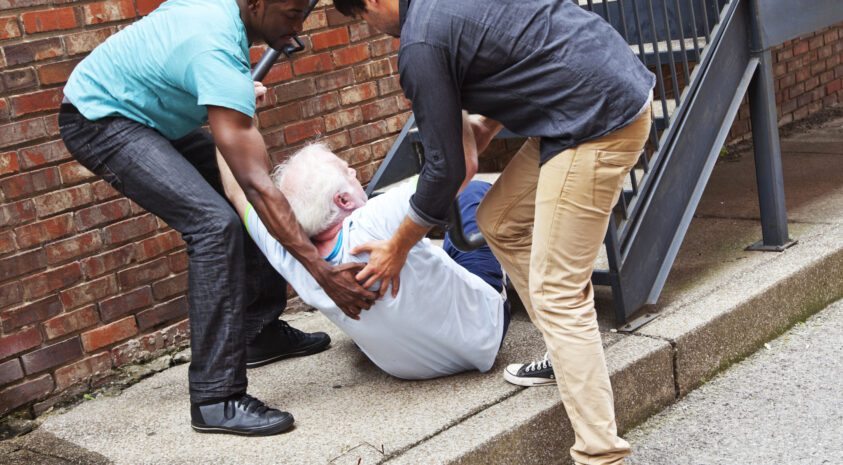For aging adults, falling is a serious concern. One out of four older people (65+) fall each year, often leading to consequences like hip fractures or head injuries — but less than half tell their doctor. And falling once doubles your chances of falling again.
Whether you’re looking to prevent falls in your aging parents, or you’re concerned about yourself, here are some tips to follow to help you stay safe.
Why is falling so dangerous?
Falling might not seem like a major concern. But the older you get, the more detrimental a fall can be.
Statistics from the CDC show that one out of five falls causes a serious injury. Over 800,000 patients per year are hospitalized because of a fall injury. And injuries like a hip fracture can be very difficult for an older adult to recover from. Often, he or she might no longer be able to live alone after sustaining a hip fracture or other injury.
A simple fall can lead to serious, long-term consequences. This is why it’s crucial to take every precaution you can to avoid falling.
Telltale signs of fall risk
According to research, you are more at risk of falling if you are living with:
- Lower body weakness or loss of muscle mass
- Vitamin D deficiency
- Vision problems
- Foot pain
- Difficulty walking or staying balanced (medications and health conditions can both affect your balance)
- Cognitive impairment, confusion, or dementia
Even if you feel steady on your feet, you could still be at risk for a fall due to environmental factors. A broken step or a throw rug on the floor might unexpectedly trip you up.
7 ways to lower your fall risk
Follow these low-effort, high-impact tips to keep yourself safe.
1. Stay active
Improving your physical strength, balance, and overall health is one of the most important fall prevention strategies you can undertake. Consider working with a physical therapist or joining an exercise program at your local gym — many health centers have classes that are specifically geared for older adults to help prevent falls.
2. Wear the right kind of shoes
Stay away from socks, flip-flops, or high heels. These make it easy to slip or trip. Instead, opt for sturdy shoes with nonskid soles that fit you properly.
3. Use a mobility device
If you know you’re unsteady on your feet, use a mobility aid like a walker or cane. It can be difficult to admit you need help. But using an assistive device is a much better option than potentially sustaining a life-altering fall.
4. Keep your home well-lit
Use bright lights in your home so you can see as you navigate rooms and hallways. Consider adding a night light in areas like bedrooms, bathrooms, and hallways; turn on the lights before going up or down the stairs. And for any light switches that are not near the entrance to the room, leave yourself a clear path to reach them.
5. Take your time
Whether you’re walking down the hallway, standing up from the couch, or making food in the kitchen, don’t rush! You’re more likely to fall if you are in a hurry. Slow and steady wins the race.
6. Make home modifications
As you age, your home might need some tweaks to allow you to continue living safely and independently. These might include:
- Grab bars and handrails (particularly in the bathroom)
- Using a shower chair
- A raised toilet seat
7. Keep things clean
Clutter on the floor can be a common cause of falling. Spend a few minutes picking up your home every day and removing any tripping hazards. If you need help, hire a housecleaning service or a neighborhood teenager who can aid in keeping your environment safe.
What to do if you fall
Despite your best efforts, there may still come a time when you fall, either in your home or elsewhere. In that case, it’s important to know what to do.
If you fall, take a moment to assess the situation before you get up. Do you seem to be hurt? Are you in pain? If so, call for help. If you live alone, keeping your cell phone on your person (and by your bed at night) can be a smart idea.
If you are not hurt, you can get up from the floor. Don’t simply jump up and continue with your day. Instead, use caution, slowly pushing yourself to a sitting position and then crawling toward a sturdy piece of furniture to hold onto as you get up. Sit still for a moment before moving on.
Finally, make sure to mention any falls to your doctor, even if you didn’t think you were injured.
We’re Here for You!
Bankers Life is here to help you leave behind the legacy you desire for your family. We have the right solutions to help families grow, protect and pass on wealth. Learn more about us here.



